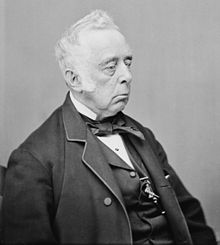Reverdy Johnson
Reverdy Johnson (born May 21, 1796 in Annapolis , Maryland , † February 10, 1876 ibid) was an American lawyer , politician , diplomat, US Senator and Attorney General .
Studies and professional career
The son of a lawyer graduated after school to study law . After being admitted to the bar, he took up a position in a law firm in Baltimore in 1815 , where he became a partner of former Attorney General William Pinkney and Roger B. Taney . In the following decades, Johnson worked mainly as a lawyer except for his political activities.
From 1816 to 1817 he was Assistant Attorney General of Maryland and then briefly chief commissioner for bankrupt debtors .
Political career
Senator and Attorney General under President Taylor
Johnson began his political career in 1821 when he was elected a member of the Maryland Senate , of which he was a member until 1825. It was not until March 4, 1845 that he took over a political office again after being elected US Senator . There he represented the interests of the Whig Party until March 7, 1849 .
On March 8, 1849 it called US President Zachary Taylor to the Minister of Justice (Attorney General) in his Cabinet . He held this office until President Taylor's death and then resigned on July 21, 1850. Successor was the previous governor of Kentucky , John J. Crittenden .
As a representative of the conservative wing of the Democratic Party , he supported Stephen A. Douglas in the presidential election of 1856 .
Civil War, US Senator and Ambassador
As a lawyer he was defense counsel for the defendant in the Dred Scott v. Sandford . This was a trial before the Supreme Court of the United States . The by Chief Justice Taney, the longtime partner Johnson announced judgment, which strengthened the rights of slaveholders, is considered by many as a major reason for the outbreak of the American Civil War and the subsequent abolition of slavery through the adoption of the Additional Articles 13 , 14 and 15 to United States Constitution seen.
Johnson himself was an opponent of slavery and a key figure in preventing Maryland's secession from the Union . In 1861 he represented his home state at the peace convention. In the same year he became a member of the House of Representatives from Maryland , of which he was a member until 1862. After the conquest of New Orleans on April 25, 1862, President Abraham Lincoln assigned him to review the decisions of the city's military commander, General Benjamin Franklin Butler , who was later recalled for his draconian measures against the civilian population.
On March 4, 1863, he was re-elected as representative of Maryland to the US Senator . He held this office until July 10, 1868.
After the Civil War he advocated a more moderate policy of reconstruction than the official opinion of the Radical Republicans . In 1866 he was a delegate to the National Union Convention, which President Andrew Johnson supported. His report on the deliberations of this meeting was later also part of the impeachment proceedings against Johnson in February and March 1868.
Johnson appointed him envoy to the United Kingdom in 1868 . Soon after his arrival in England he signed the Johnson-Clarendon Treaty with Secretary of State George Villiers for the settlement of disputes over the Civil War. However, the Senate refused to ratify the treaty. After Ulysses S. Grant took office on March 4, 1869, he was recalled from his post.
He then went back to work as a lawyer and as such was involved in the indictment against the Ku Klux Klan by the government . In the following years he also reported on the decisions of the Maryland Court of Appeal .
Johnson died in a fall from the balcony of the Maryland Governor's residence in Annapolis.
literature
- Bernard C. Steiner: Life of Reverdy Johnson . The Norman, Remington Co, Baltimore 1914, archive.org .
- Johnson, Reverdy . In: James Grant Wilson, John Fiske (Eds.): Appletons' Cyclopædia of American Biography . tape 3 : Grinnell - Lockwood . D. Appleton and Company, New York 1887, p. 446 (English, Textarchiv - Internet Archive ).
Web links
- Reverdy Johnson in the Miller Center of Public Affairs of the University of Virginia (English)
- Biography on the homepage of the Ministry of Justice
- Reverdy Johnson in the Biographical Directory of the United States Congress (English)
- Biography in the US legal dictionary
| personal data | |
|---|---|
| SURNAME | Johnson, Reverdy |
| BRIEF DESCRIPTION | American lawyer and attorney general |
| DATE OF BIRTH | May 21, 1796 |
| PLACE OF BIRTH | Annapolis , Maryland |
| DATE OF DEATH | February 10, 1876 |
| Place of death | Annapolis , Maryland |


